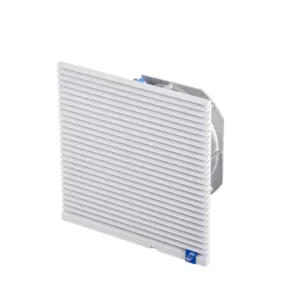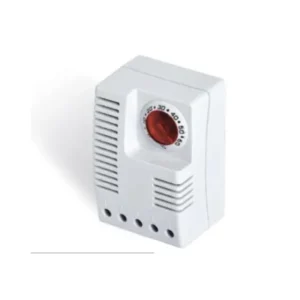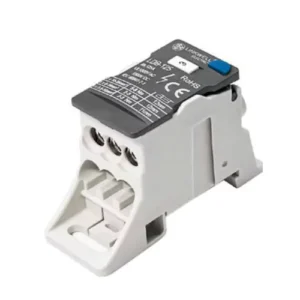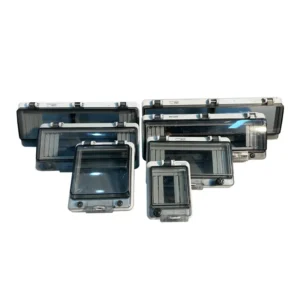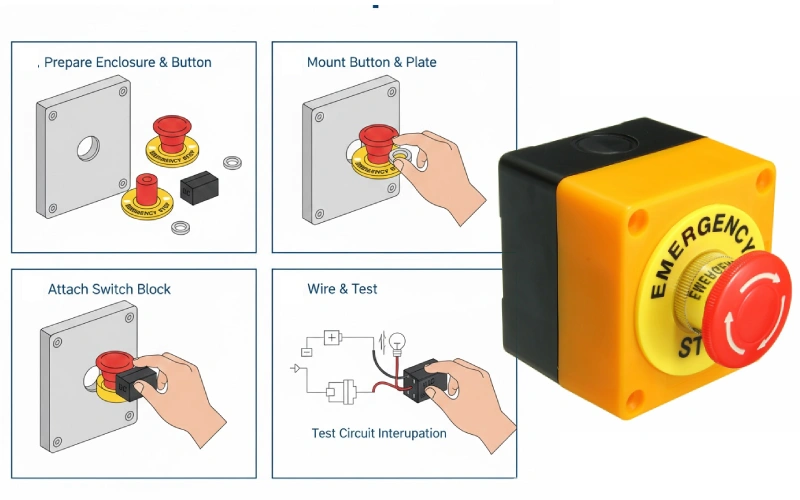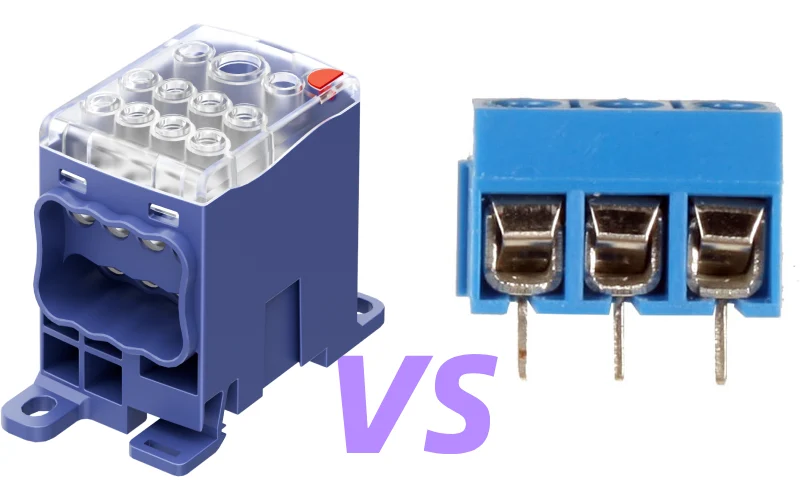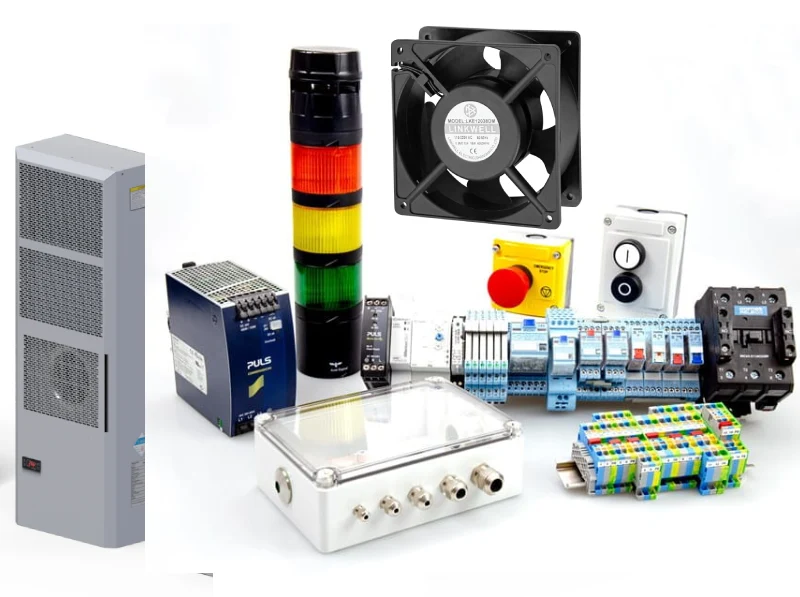When you think about running machines or keeping lights on in a factory, you rely on a control panel. This essential system acts as the brain, letting you manage and automate power flow with ease. The global market for electrical control panels has reached over $5 billion in 2024, driven by the need for smarter automation. If you ask, “What is Control Panel?”—it’s the solution that gives you safe, reliable power control. Linkewell stands out as a trusted name, offering high-quality, customizable control panel options for every industry.
Key Takeaways
- An electrical control panel acts as the command center to safely manage and automate power for machines and systems.
- Control panels include key parts like switches, circuit breakers, relays, and PLCs that help control, protect, and monitor equipment.
- Different types of control panels serve specific needs, such as power control, motor control, and automation for advanced tasks.
- A well-designed control panel improves safety, reduces downtime, and boosts efficiency in industrial and commercial settings.
- Choosing high-quality, certified panels with proper maintenance ensures long-lasting performance and peace of mind.
What is Control Panel
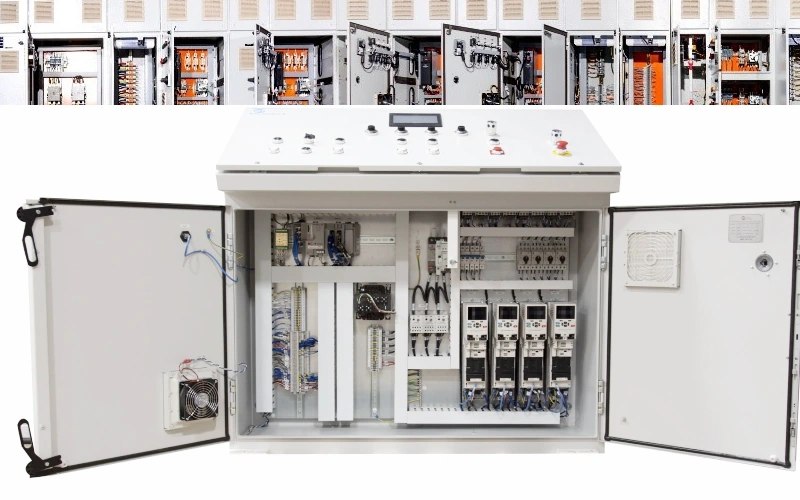
Definition
If you have ever wondered what is control panel, you are not alone. Many people see these metal boxes in factories or buildings and ask, “What is control panel, and why is it so important?” A control panel is a central unit that houses all the electrical devices you need to run and monitor machines, lights, or even an entire building. You can think of it as the command center for your electrical system. When you open a control panel, you will find switches, circuit breakers, relays, and other parts that help you manage power safely and efficiently.
When you ask what is control panel, you are really asking about the heart of any control system. This panel brings together all the wires and devices in one place, making it easy for you to control, monitor, and maintain your equipment. You do not have to walk around to different machines. Instead, you can stand in front of the control panel and see everything you need.
Main Functions
So, what is control panel used for? You will find that its main job is to give you full control over your electrical equipment. Here are the key functions you get from a control panel:
- Centralized Control: You can turn machines on or off, adjust settings, and check system status—all from one spot.
- Protection: Circuit breakers and fuses inside the panel protect your equipment from overloads and short circuits. This keeps your workplace safe and prevents fires.
- Monitoring: The panel shows you real-time data with indicator lights and meters. You can spot problems quickly and fix them before they get worse.
- Automation: With relays, contactors, and sometimes programmable logic controllers (PLCs), you can automate tasks. This means you do not have to do everything by hand.
- Troubleshooting: If something goes wrong, you can use the control panel to find the issue fast. All the wiring and devices are organized, so you do not waste time searching.
Tip: A well-designed control panel makes your life easier. You spend less time fixing problems and more time keeping things running smoothly.
Here is a quick look at some common parts and what they do in a control panel:
Recommended products
| Component | What It Does for You |
|---|---|
| Switches | Let you turn equipment on or off and adjust settings easily. |
| Indicators | Show you if the system is working, if there is an alarm, or if something needs attention. |
| Circuit Breakers | Protect your machines by stopping power during overloads or short circuits. |
| Relays | Help you control big machines with small signals. |
| Contactors | Switch large electrical loads on or off and protect against overloads. |
| Transformers | Adjust voltage levels so your equipment runs safely. |
| Terminal Blocks | Keep all your wires neat and easy to manage. |
| Fuses | Break the circuit if too much current flows, keeping your system safe. |
| Motor Drives | Control the speed and power of motors for precise operation. |
You might wonder how long a control panel lasts. In most heavy industrial settings, a control panel can work for 20 to 40 years if you take care of it. Keeping the panel clean, checking connections, and replacing worn parts will help it last even longer. If you use high-quality parts and keep the panel in a good environment, you will get the most out of your investment.
But what can go wrong? Sometimes, power spikes or surges can damage the panel. Overheating, loose wires, or poor installation can also cause problems. If you skip regular maintenance or use cheap parts, you might face more breakdowns. That is why choosing a trusted brand and following best practices is so important.
When you understand what is control panel, you see how it keeps your machines running, protects your team, and saves you time. It is the backbone of any modern control system.
Control Panel Components
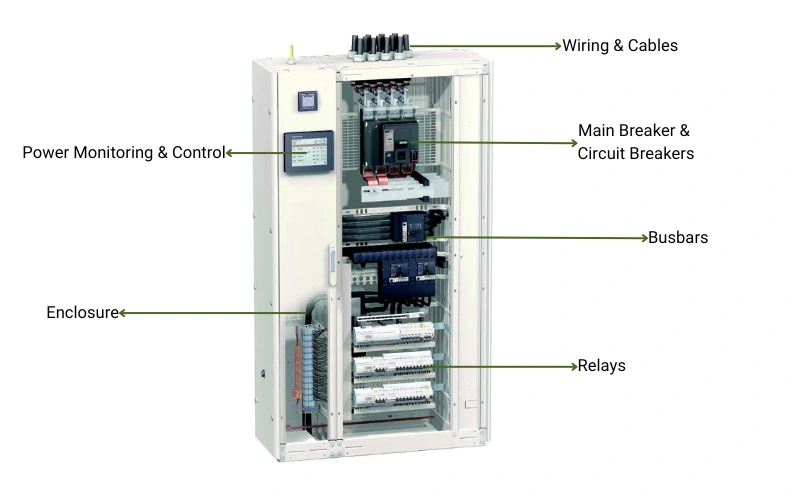
When you look inside control panels, you see a smart mix of parts working together. Each part plays a key role in keeping your systems safe, efficient, and easy to manage. Linkewell designs control panels with certified, high-quality components and modular layouts, so you get flexibility and reliability every time. Let’s break down the main components you’ll find.
Enclosure
The enclosure is the first thing you notice. It protects everything inside from dust, moisture, and accidental contact. You can choose from different materials based on your needs. Here’s a quick comparison:
| Material | Advantages | Considerations |
|---|---|---|
| Metal | Durable, good heat dissipation, easy to customize | Needs coating for corrosion, heavier |
| Thermoplastics | Corrosion resistant, great insulation, easy to modify | Limited shapes and sizes |
| Fiberglass | Rust-proof, chemical resistant, good for harsh settings | Hard to modify, degrades in sunlight/heat |
Enclosure materials also tie into ratings like NEMA, IP, and UL. These ratings help you pick the right enclosure for indoor, outdoor, or hazardous environments. Linkewell offers enclosures that meet strict UL, CE, and IEC standards, so you know your control panels are protected.
Circuit Breakers
Circuit breakers act as the safety guards in your control panels. They stop the flow of electricity if there’s an overload or short circuit. Not all breakers are created equal. Industry studies show that some brands have failure rates as high as 50%, which can lead to fires and property damage. That’s why Linkewell only uses certified breakers from trusted brands like Siemens and Schneider. You get peace of mind knowing your equipment is safe and up to code.
Relays and Contactors
Relays and contactors help you control power to different machines. Contactors handle high currents and switch big loads like motors or HVAC units. Relays work with lower currents and provide precise control. Both are essential for reliable automation. When you use the right device for the job, your control panels last longer and run smoother. Regular maintenance, like checking contacts and cleaning, keeps everything working at its best.
PLCs and Wiring
PLCs (Programmable Logic Controllers) are the brains behind automation in modern control panels. Siemens leads the market, followed by Rockwell Automation and Schneider Electric. Here’s a look at the market share:
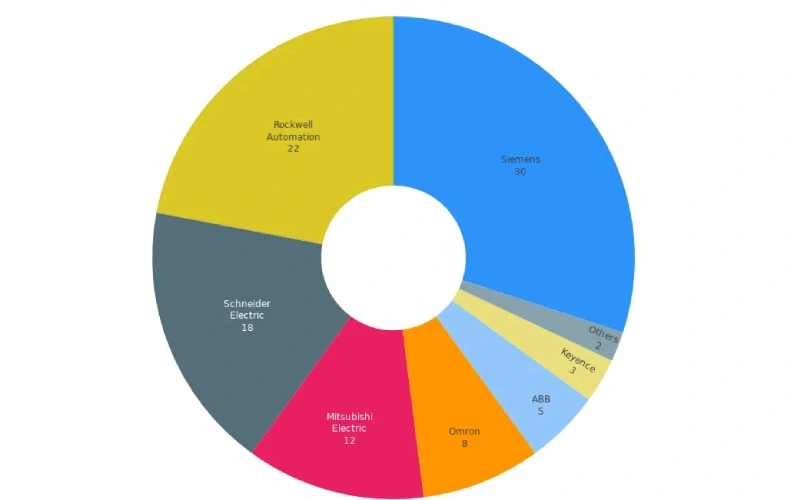
Linkewell builds control panels with top PLC brands and follows strict wiring standards. You get organized wiring, clear labels, and safe routing. This makes troubleshooting easy and keeps your system running smoothly. Proper wire sizing, separation of power and control circuits, and solid grounding are all part of Linkewell’s approach to quality.
Tip: Always choose control panels with certified components and clear documentation. This saves you time and money in the long run.
How Control Panels Work
Power Distribution
When you open a control panel, you see how it manages power for your entire system. Power usually enters at a high voltage, like 480 Vac in many factories. The control panel uses several steps to make sure every device gets the right amount of power:
- Circuit breakers and fuses protect your equipment from overloads.
- Wires and cables are sized to carry the right current safely.
- Transformers step down high voltage to lower levels, such as 120 Vac, for control devices.
- Power supplies convert AC to DC, often providing 24 Vdc for automation parts like PLCs.
- Surge suppressors and power conditioners keep sensitive electronics safe from spikes and poor-quality power.
- Power distribution blocks and terminal blocks send power to each device inside the panel.
You can trust that a well-designed control panel follows strict codes like NEC and UL 508A. This keeps your system safe and reliable, even as your needs grow.
Automation Process
Control panels do more than just move power—they help you monitor and control your machines automatically. Inside, you’ll find PLCs, sensors, relays, and HMIs working together. These parts let you set up custom programs for your machines. For example, you can:
- Control robotic arms on an assembly line
- Monitor temperature and pressure in real time
- Automate conveyor belts and sorting systems
- Manage climate controls in storage rooms
- Integrate renewable energy sources
With a modern control panel, you get sophisticated monitoring and control. This means you can quickly identify and respond to problems, reduce human error, and boost productivity. The control system inside the panel keeps everything running smoothly, so you don’t have to worry about every detail.
Safety Features
Safety is a top priority in control panels. You want to prevent damage or injury, so these panels include smart features:
- Clear labels on wires and devices help you troubleshoot fast.
- Proper spacing between parts lets heat escape and makes upgrades easier.
- Grounding and shielding protect against electrical faults.
- Extra circuit breakers and fuses guard each branch of the system.
- Organized wiring and shielded cables cut down on electrical noise.
- Safety shields and warning labels keep you safe from arc and flash hazards.
Tip: Regular inspections and good housekeeping keep your control panel safe and reliable. Always follow safety rules and keep the area around the panel clear.
With these features, you get improved safety and peace of mind. You can monitor and control your equipment with confidence, knowing your panel is built to protect both people and machines.
Types of Control Panels
When you look at control panels, you’ll notice that not all of them do the same job. Each type has a special purpose, and knowing the difference helps you pick the right one for your needs. Linkewell offers a full range, including AMF (Automatic Mains Failure), APFC (Automatic Power Factor Correction), MCC (Motor Control Centers), and other industrial control panels. Here’s a quick comparison to help you see what sets each type apart:
| Panel Type | Purpose and Scope | Key Features and Components | Typical Use Cases |
|---|---|---|---|
| Power Control Panels | Manage and distribute power to equipment | Circuit breakers, switches, meters, surge protectors, transformers | Factories, buildings, data centers |
| Motor Control Centers (MCCs) | Centralize control for multiple motors | Motor starters, overload relays, disconnects, VFDs, PLCs, operator interfaces | Manufacturing, water treatment, conveyor systems |
| Electrical Enclosure Added Panel | Customize | Customize | Customize |
| Automation Panels | Automate complex processes and equipment | PLCs, I/O modules, communication ports, HMIs, sensors, relays | Robotics, energy plants, advanced manufacturing |
Power Control
You use power control panels when you need to manage electricity for different machines or systems. These panels help you turn equipment on or off, monitor power use, and protect against overloads. Linkewell’s power control panels come with certified components and clear labeling, so you can trust them in any industrial setting.
Motor Control Centers
Motor control centers, or MCCs, let you control several motors from one place. You get organized starters, relays, and breakers all in one cabinet. This setup makes it easy to maintain and expand your system. If you run a factory or a big facility, MCCs save you time and keep your motors running smoothly. Linkewell’s MCCs meet strict safety standards and work well in tough environments.
Automation Panels
Automation panels take things to the next level. You get more than just switches and breakers. These panels include PLCs, which act like the brains of your operation. Here’s what makes automation panels stand out:
- PLCs process inputs and control outputs for smart automation.
- I/O modules connect sensors and switches to the system.
- Communication ports let you link up with other devices.
- HMIs give you touchscreens and buttons for easy control.
- You can automate tasks, reduce manual work, and boost efficiency.
If you want to control robots, manage energy, or run advanced production lines, automation panels are your best choice. Linkewell’s industrial control panels offer full customization, so you get exactly what you need for your business.
Control Panels and Electrical Enclosures
Electrical Enclosures Components
When you open an electrical control panel, you see more than just a metal box. The enclosure acts as the first line of defense, keeping dust, moisture, and accidental bumps away from sensitive parts. You want your equipment to last, so the right enclosure matters.
Inside, you’ll find a smart layout of components, each with a job to do. Here’s what you can expect in most electrical enclosures:
- Enclosure and Backplate: The enclosure shields everything inside. The backplate gives you a sturdy place to mount devices.
- Grounding Panel: This keeps you safe by directing stray electricity away from important parts.
- Programmable Logic Controllers (PLCs): These act as the brains, running automation programs and making decisions for your system.
- Circuit Breakers: You rely on these to stop power if something goes wrong, protecting your machines from damage.
- Terminal Blocks: These keep your wiring neat and organized, making it easy to trace connections.
- Relays and Contactors: You use these to switch devices on or off, often handling large electrical loads.
- Motor Controllers: These manage how motors start, stop, and run, giving you precise control.
- Surge Suppressors: These protect your equipment from sudden voltage spikes.
- Fuses: If too much current flows, fuses break the circuit and prevent bigger problems.
- Power Supplies: These convert AC power to DC, which many control devices need.
- Communication Devices: These let your panel talk to other systems or send data to your computer.
- DIN Rails and Wire Ducts: These help you mount and organize all the parts, keeping everything tidy and safe.
Tip: A well-organized enclosure makes troubleshooting and upgrades much easier. You save time and avoid headaches when every component has its place.
You can see that every part inside the enclosure works together to keep your system running smoothly. When you choose a panel from Linkewell, you get a design that puts safety, order, and reliability first. That’s how you keep your operations efficient and your team safe.
Control Panel Applications
Industrial Uses
You see electrical control panels everywhere in industry. They help you run machines, keep production lines moving, and make sure everything works safely. Here’s a quick look at where you’ll find them most:
| Industrial Sector | Usage Rate / Market Share (2025) | Key Usage Details |
|---|---|---|
| Chemicals | 50% | Automation in chemical plants, refineries, and petrochemical sites |
| Manufacturing | N/A | Essential for automotive, textiles, food processing, and heavy equipment |
| Oil & Gas | N/A | Used for drilling, refining, and pipeline monitoring |
| Energy & Power | N/A | Power plants and substations rely on panels for grid stability |
| Agriculture | N/A | Controls irrigation, pumps, and greenhouse systems |
Linkewell’s panels fit right into these sectors. You can count on them for reliable performance in manufacturing, energy, and even agriculture. Their panels help you monitor and control every part of your operation, from motors to sensors.
Commercial and Telecom
In commercial buildings and telecom networks, control panels play a huge role. You use them to keep lights on, HVAC running, and security systems active. In telecom, they make sure networks stay up, even during storms or outages. Here’s how they help you:
- Digital monitoring prevents downtime and boosts increased efficiency.
- Proactive alerts warn you before problems get big.
- Machines can act automatically to avoid stoppages.
- Remote monitoring saves you time and labor.
- Real-time data helps you spot issues fast and improve operations.
- Energy data supports sustainability and cost savings.
You get stable power for your business, and your telecom systems stay reliable. Linkewell’s solutions support smart buildings, data centers, and telecom towers, making sure you stay connected and efficient.
Benefits for Businesses
When you choose advanced control panels, your business gets real advantages:
- Real-time energy monitoring helps you cut costs.
- Smart integration supports renewable energy and sustainability.
- You can qualify for government incentives with modern panels.
- Automation improves product quality and speeds up production.
- Online access to panel data and documentation keeps you informed.
- Flexible capacity management lets you adapt to busy seasons.
- Warranty and UL compliance give you peace of mind.
Tip: With Linkewell, you get energy efficiency, safety, and 24/7 support. Their panels help your business grow and stay ahead in a fast-changing world.
You now know a control panel acts as the command center for your machines, keeping everything running safely and efficiently. When you choose electrical control panels, you want more than just a box of wires. Look for these factors in a manufacturer:
- Rigorous quality control and testing
- Compliance with UL and other certifications
- Custom design options for your needs
- Strong support and clear communication
High-quality components help your control panel last longer and reduce downtime. With Linkewell, you get reliable performance, energy savings, and solutions that fit any industry. If you want peace of mind and a smarter operation, consider Linkewell for your next control panel.
FAQ
How do I choose the right electrical control panel for my needs?
Start by listing your equipment and power requirements. Think about where you’ll install the panel and what features you want, like remote monitoring or auto-switching. You can always ask Linkewell for help with custom designs.
What certifications should I look for in a control panel?
You want panels that meet UL508A, IEC 61439, or local standards. These certifications mean your panel is safe, reliable, and built to last. Linkewell’s panels come with full test reports and international certifications.
Can I use electrical control panels outdoors?
Yes, you can. Just make sure you pick a weatherproof enclosure with the right IP rating, like IP55 or higher. Linkewell offers panels designed for outdoor use, so your equipment stays protected from rain, dust, and extreme temperatures.
How often should I maintain my control panel?
Check your control panel every six months. Look for loose wires, dust buildup, or signs of wear. Regular maintenance keeps your system safe and running smoothly. Linkewell provides clear instructions and replacement parts if you need them.
Conclusion
Electrical control panels are essential for safe, efficient operation across industries. From managing power and motors to enabling smart automation, they protect equipment and boost productivity.
Choosing high-quality, certified panels from a trusted brand like Linkewell ensures durability, compliance, and reduced downtime. Whether you’re upgrading or installing a new system, a well-designed control panel is the key to modern, reliable industrial and commercial operations.

